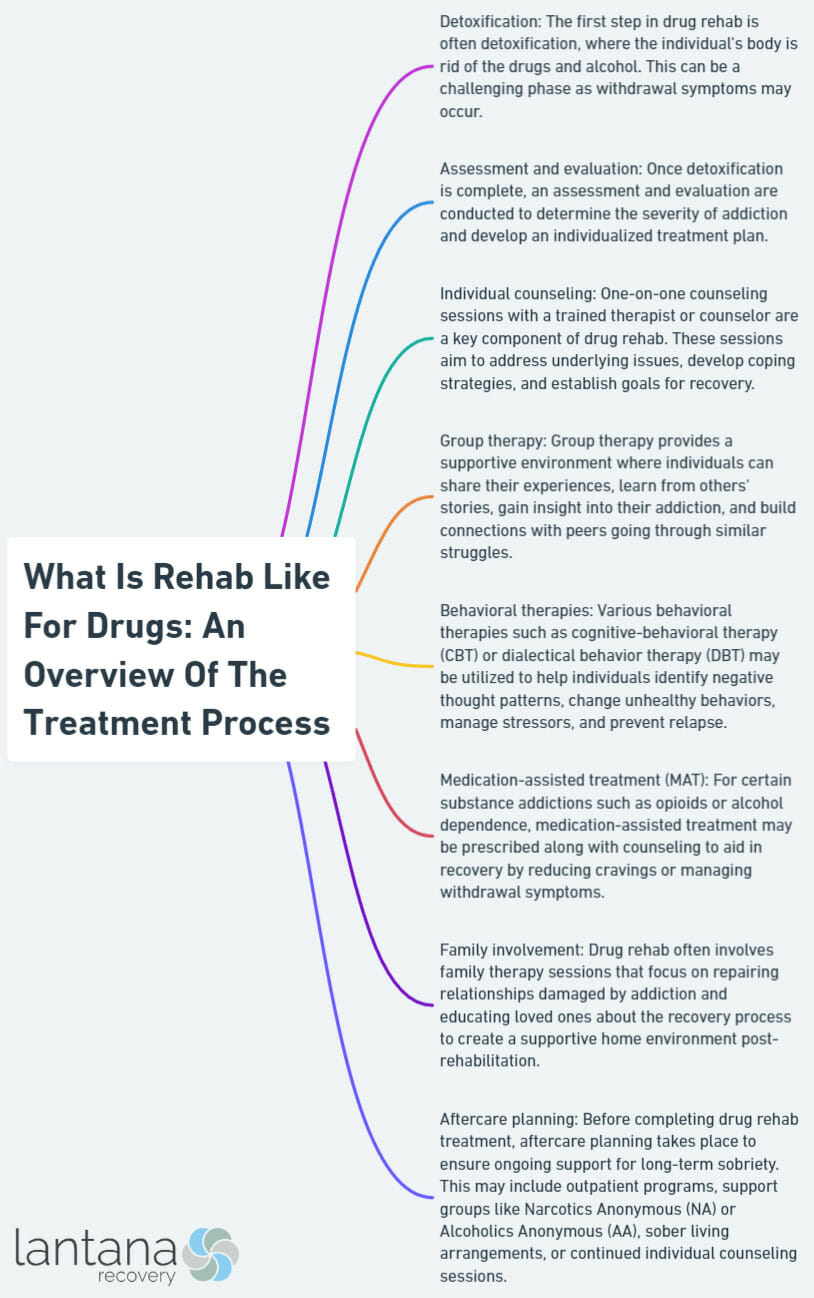Imagine entering a new stage in your life, one where you are free from the chains of addiction and ready to take on the world with newfound strength. The journey to recovery isn’t easy, but with the right support and guidance, you can conquer your drug or alcohol addiction and create a healthier, happier life. In this blog post, you’ll gain a comprehensive understanding of “what is rehab like for drugs” and learn how different treatment options can help you achieve lasting recovery.
Short Summary
-
Learn about different types of drug rehab programs and the admission process to prepare for your stay.
-
Explore therapeutic approaches such as individual therapy, family counseling, group therapy & aftercare support in a safe environment with patient rights protected.
-
Take advantage of activities like medication administration, physical exercise & mindfulness practices to set yourself up for lasting recovery success!
Understanding Drug Rehab: Types and Differences

Navigating the complex world of substance abuse and addiction treatment can be overwhelming. But don’t worry, we’re here to help you understand the various types of rehab programs available, including inpatient treatment, residential treatment, and outpatient treatment.
By exploring the differences and benefits of each, you’ll be better equipped to choose the right path for your unique journey to recovery.
Inpatient Treatment
Inpatient treatment programs, such as alcohol rehab treatment, provide 24-hour care for individuals battling drug or alcohol addiction, offering a safe and structured environment to focus on recovery. At facilities like Lantana Recovery drug rehab in Charleston, you’ll receive round-the-clock medical supervision and support, helping you break the chains of addiction and manage any withdrawal symptoms that may arise.
Each inpatient treatment program begins with a personalized client assessment to ensure you receive the best care possible. This includes medically managed detox centers, which provide a secure environment and access to resources to help you break free from substance abuse. Through this intensive care, inpatient treatment offers you a solid foundation for long-term recovery.
Residential Treatment
Residential treatment offers a more comprehensive approach to addiction recovery, providing 24-hour care in a supportive environment. This type of substance abuse treatment program typically lasts 30 to 90 days and includes medical care, detoxification, and therapy services to help you achieve lasting recovery.
During detoxification, you may experience severe cravings, anxiety, and other withdrawal symptoms. Medical supervision is essential for successfully reducing and eventually eliminating physical dependence on a substance, as it helps to prevent drug abuse. Without professional assistance, there is a heightened risk of relapse and overdose.
Residential treatment programs focus on long-term recovery and support, equipping you with the tools and skills needed to maintain sobriety and live a healthier life. Usually, these types of programs have a higher chance (65%) completion rate than outpatient treatment programs (52%), especially for opioid users, speculates Gerahld J. Stahler and his team from Temple University, Florida in Journal of Addictive Behaviors, 2016.
Outpatient Treatment
Outpatient treatment programs offer a more flexible approach to addiction recovery, providing a range of options such as partial hospitalization programs, intensive outpatient programs, and general outpatient programs. These programs allow you to continue with your daily life while receiving part-time treatment and support.
Partial hospitalization programs provide 20 or more hours of addiction treatment services per week, with treatment sessions lasting 4-8 hours a day. Intensive outpatient treatment programs offer a less time-demanding treatment per day or week, while general outpatient programs typically provide fewer than 9 hours of treatment each week, usually in the form of individual or group therapy sessions.
Outpatient treatment programs are an alternative to a typical drug rehab and offer you the flexibility and support needed to achieve lasting recovery while maintaining your everyday responsibilities.
The Admission Process: Preparing for Rehab

As you embark on your journey to recovery, it’s essential to prepare for your time in rehab. This includes arranging for friends and family to take care of your home, bills, children, and pets, as well as ensuring you have everything you need for your stay at the treatment center.
By taking these steps, you’ll be able to focus on your recovery and make the most of your time in rehab.
Initial Assessment
Upon entering rehab, you’ll go through an intake interview process to gather information about your medical history, psychological state, and addiction risk factors. This information is used to create a customized treatment plan tailored to your unique needs, ensuring you receive the most effective care during your time in rehab.
The intake interview also helps motivate you to make positive changes in your life by asking questions related to your substance use and lifestyle. By addressing potential addiction risk factors such as traumatic events and childhood abuse, the intake clinician can gain a better understanding of your individual needs and challenges, allowing them to create a more personalized and effective treatment plan.
Detoxification

Detoxification is a crucial first step in the drug and alcohol rehab process. This essential phase helps to safely and effectively remove drugs or alcohol from your body and manage any withdrawal symptoms that may arise. By undergoing detox, you’ll be better prepared to successfully participate in treatment and work towards lasting recovery.
Managing withdrawal symptoms during detox can be challenging, but there are strategies to help you through this process. Medications can help reduce cravings and manage physical symptoms, while therapies can address underlying psychological issues. Infact, a combination of behavioral and pharmacological intervention increases the chances of initial abstinence and relapse prevention, concludes Douaihy et al, in their review study titled Medications for Substance Use Disorders
Additionally, lifestyle changes such as exercise, healthy eating, and stress management can also help you manage withdrawal symptoms and set the stage for a successful rehabilitation journey.
A Day in the Life of a Drug Rehab Patient

A typical day in drug rehab is structured and supportive, designed to help you make the most of your time in treatment. From morning routines filled with mindfulness practices to engaging afternoon therapy sessions and relaxing evening activities, each day in rehab is an opportunity to learn, grow, and heal.
Let’s take a closer look at what you can expect during a day in rehab.
Morning Routine
Your morning routine in drug rehab will typically start with medication administration and a nourishing breakfast to fuel your day. Afterward, you’ll participate in engaging group therapy sessions and calming mindfulness practices like meditation or yoga. These activities help set a positive tone for the day and provide motivation for your ongoing recovery journey.
The morning routine is just the beginning of your day in rehab. By embracing the structure and support offered throughout the day, you’ll be better equipped to tackle the challenges of addiction recovery. Each morning is a chance to start fresh and make progress on your path to a healthier, happier life.
Afternoon Activities
In the afternoon, you’ll dive into a series of therapeutic sessions designed to help you make progress on your journey to recovery. These sessions may include individual therapy, fitness sessions, and educational courses on addiction, mental health, and nutrition. The goal of these afternoon activities is to provide you with the tools, knowledge, and support needed to overcome addiction and maintain long-term recovery.
Individual therapy sessions can help you gain insight into your progress and provide a supportive environment to discuss any issues you may be facing. Physical exercise can be beneficial in helping to manage mood swings and stay on track during withdrawal. Regular physical activity can provide practical, mindful relief. Finally, balanced nutrition can empower you to manage the stress of recovery and even reduce withdrawal cravings.
Evening Schedule
As the day winds down, your evening schedule in drug rehab will typically include dinner, group sessions, and 12-step meetings. These activities offer a chance to reflect on your progress, connect with others in recovery, and build a strong support network for your journey ahead.
In addition to these structured activities, you’ll also have personal free time to unwind, relax, and recharge. Whether you choose to read, watch television, take a nap, or simply enjoy some quiet time, your evening schedule in drug rehab is designed to provide a balance of support and relaxation, setting the stage for another productive day in your recovery journey.
Therapeutic Approaches in Drug Rehab

Rehab programs utilize a variety of therapeutic approaches tailored to your individual needs, ensuring you receive the most effective care during your time in treatment. From cognitive behavioral therapy to motivational interviewing, these evidence-based techniques can help you overcome addiction and create lasting change in your life.
These approaches are designed to help you identify and address the underlying causes of your addiction, as well.
Individual Therapy
Individual therapy is a cornerstone of addiction treatment, helping you identify and address addiction triggers and develop healthy coping mechanisms. Techniques like cognitive-behavioral therapy and motivational interviewing are often used in individual therapy sessions to help you recognize the connection between your thoughts, feelings, and behaviors, and make positive changes in your life.
By working one-on-one with a therapist, you’ll have the opportunity to gain a deeper understanding of your addiction and build the skills needed to maintain lasting recovery. Individual therapy sessions provide a safe and supportive environment for you to explore your emotions, discuss your challenges, and develop new strategies for coping with stress and adversity.
Family Counseling
Family involvement is crucial in the addiction recovery process, as it helps both the addicted person and their family members understand addiction and how to better support one another in early recovery. Family counseling can improve treatment outcomes, making it an invaluable tool in the recovery journey.
In 2022, a scientific review of 13 studies explored the concept of family involvement in addiction recovery process and reported, “couple and family based therapies produce benefits for SUD whether they are being provided as the exclusive treatment or as part of a multi-component treatment program.” (Couple and family therapy for substance use disorders: Evidence-based update 2010-2019, Aaron Hogue, 2022)
During family therapy, you and your loved ones will participate in counseling sessions designed to facilitate open communication, address any issues, and provide ongoing support. By involving family members in the recovery process, you can build a strong support system that will help you maintain lasting sobriety long after you leave the rehab facility.
Group Therapy
Group therapy plays a vital role in the rehab process, providing a supportive atmosphere for individuals in treatment to share their experiences, learn from others, and build meaningful connections. Through group therapy, therapists facilitate meaningful conversations about recovery and its many components, helping participants gain valuable insights and develop a strong support network.
Group therapy can take a variety of forms. These forms include psychoeducation groups on emotional recovery topics, process groups to tackle difficult emotions, life skills groups for skill development, medical groups for medical information, and recreational groups to learn how to enjoy activities without substance use. By participating in these diverse group sessions, you’ll be better equipped to face the challenges of addiction recovery and maintain long-term sobriety.
Aftercare and Ongoing Support

The journey to recovery doesn’t end when you leave rehab – it’s just the beginning. Aftercare planning is a crucial component of rehab programs, providing ongoing support and resources to help you maintain your newfound sobriety.
This includes social and medical support services, transitional housing, therapy, and lifestyle changes that can help you build a strong foundation for long-term recovery, with the guidance of mental health services administration. These aftercare support programs are crucial for lasting recovery and improve the success rate of a drug rehab treatment.
Patient Rights in Rehab

As a patient in a rehab center, you have rights that empower you to make informed decisions about your own care and protect you from any form of cruel treatment. You also have the option to designate someone else to make decisions about your care if you are unable to do so.
By understanding your rights as a patient, you can take charge of your recovery journey and ensure that you receive the best possible care.

Summary
Recovery from drug or alcohol addiction is a challenging journey, but with the right support and guidance, you can break free from the chains of addiction and create a healthier, happier life. By understanding the various types of rehab programs, the admission process, a typical day in rehab, therapeutic approaches, aftercare planning, and your rights as a patient, you’ll be better equipped to navigate the road to recovery. Remember, the journey to lasting sobriety is a lifelong process, but with determination, resilience, and a strong support system, you can overcome addiction and reclaim your life.
Frequently Asked Questions
What does life look like after rehab?
Life after rehab will involve returning to your normal life and facing potential triggers. You’ll need to be prepared to cope with challenging events like job loss, divorce, or death of a loved one.
With hard work and a commitment to staying sober, a successful and fulfilling life is possible.
Why do patients go to rehab?
Patients go to rehab to help them recover movement and function lost due to health problems or treatment, to aid in quitting substance use, to recover from an injury or medical treatment, and to reduce the impact of health conditions and regain abilities needed for daily life.
Rehabilitation can help patients regain strength, balance, coordination, and endurance, as well as improve their ability to perform activities of daily living. It can also help them manage pain, reduce the risk of falls, and improve their overall quality of life.
What is the difference between inpatient and outpatient treatment?
Inpatient treatment offers 24-hour care and a structured environment for those with severe addiction, while outpatient provides flexible options to receive part-time treatment while continuing daily life.
How long do residential treatment programs typically last?
Residential treatment programs typically last 30 to 90 days, allowing time for meaningful progress and successful long-term recovery.
This length of time gives individuals the opportunity to focus on their recovery and develop the skills and strategies needed to maintain sobriety and prevent relapse.
What can I expect from group therapy sessions in rehab?
Group therapy sessions in rehab provide a safe and supportive environment to share experiences, learn from others, and build meaningful connections.
You can expect to cover topics such as emotional recovery, difficult emotions, life skills, and medical education.









